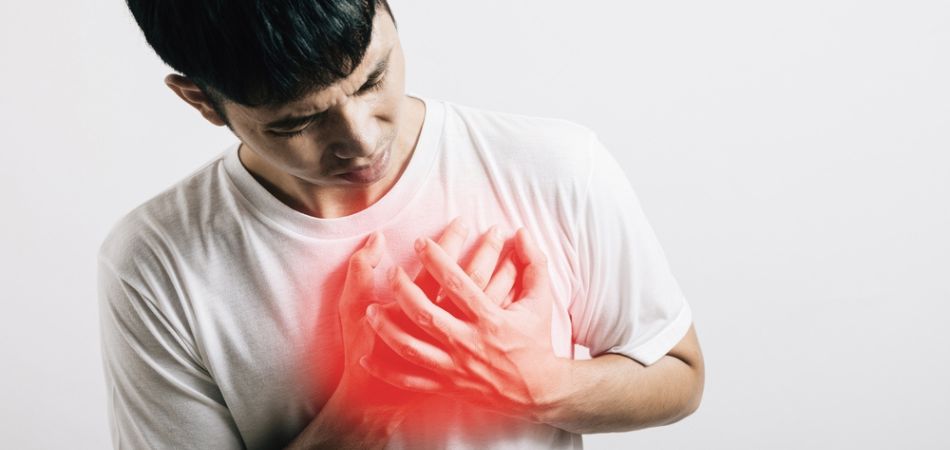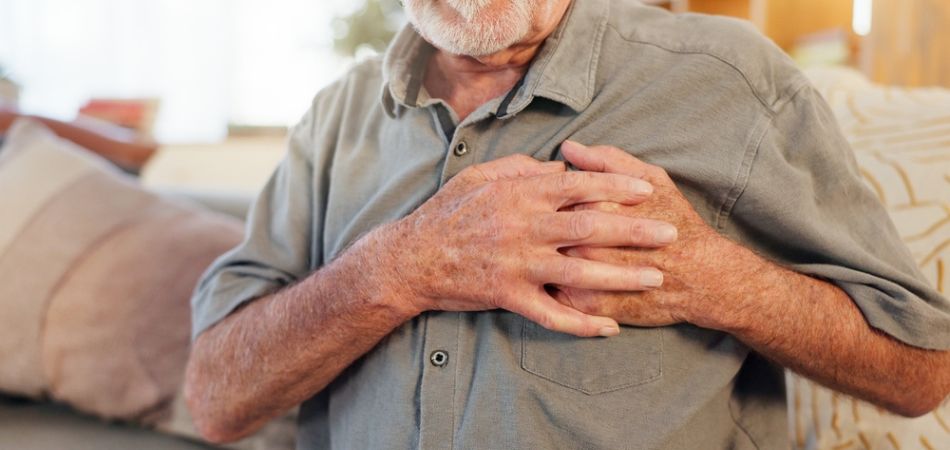
Written by:

Medically Reviewed by:
Last Updated:
October 29th, 2025
Alcohol’s damaging effects can ripple throughout every organ in the human body, manifesting as pains, sharp, dull, sudden, or lingering. If you’ve started noticing chest pain after drinking, it may be time to start paying closer attention.
Not every chest pain requires medical analysis, but in many cases, recurring minor pains precede deeper complications, especially when alcohol is involved.

What is chest pain?
Chest pain refers to discomfort or sensations of pressure in a person’s chest area. The pain itself may be described as a burning, stabbing, or shooting sensation, as well as a more general dull or aching pain. It may not always be linked to a serious condition, but it’s a symptom that should never be taken lightly, especially when alcohol is involved.
The chest is a relatively large section of the body, so pains here can be related to the heart, lungs, digestive tract, muscles, or even the nervous system. Because of this, the cause of chest pain isn’t always immediately obvious.
Some people feel chest pain during the immediate hours after consuming alcohol, while others feel it the next morning as part of the hangover. Whether your chest experiences a brief spasm or a persistent tightness, it may be a signal of a deeper problem in your body.
Why do I feel chest pain after drinking alcohol?
Alcohol is a known irritant to multiple systems in the body. Sometimes, that irritation will manifest in the chest area specifically. The discomfort may feel different depending on which system is affected. Let’s take a look at some of the most common ways alcohol can trigger chest pain:
Alcohol is also proven to increase blood pressure and trigger irregular heart rhythms (arrhythmias), especially in people who already have underlying heart issues. Alcohol addiction research also highlights a condition known as “holiday heart syndrome,” in which irregular heartbeats are experienced through binge drinking.
These effects and strains placed on your heart will result in pain localised to the chest area.
However, because digestive pain and heart pain can feel similar, it’s important not to guess where the pain is stemming from. If the pain is new, worsening, or unexplained, it should be examined by a professional.
This kind of chest pain is usually unrelated to physical damage in the body, but that doesn’t make it any less real. If you’re a person who feels anxious or panicky after drinking, especially during a hangover, chest pain might be one of the ways your body is sounding the alarm that positive change is needed.
When is chest pain after drinking a medical emergency?
If you feel as though you’re experiencing chest pain after drinking, it’s vital to pay close attention to how the pain feels, how long it lasts and what other symptoms occur alongside it. Here are some of the more severe signs that chest pain is developing into a medical emergency:
Symptoms that may signal a heart-related event
You may experience symptoms of a severe heart-related event, such as:
- Crushing, squeezing, or radiating pain leading to the arm, jaw, or back
- Shortness of breath leading to nausea or cold sweats
- Persistent and worsening physical capabilities
- A sudden sense of dread or light-headedness
Many of these chest-related pains are linked with panic attacks and cardiac arrest. These symptoms should never be ignored, especially if you’re under the influence of alcohol. Being intoxicated will cloud your ability to assess the risk itself.
Why alcohol can mask dangerous warning signs
Alcohol’s sedative effects will dull pain sensations and impair your judgement of the pain itself. Being drunk will often lead to an underestimation of the seriousness of symptoms, or delay you from seeking help.
If your chest pain comes on suddenly or feels different from past chest pains, it’s best to get checked by a healthcare professional. It’s always better to rule out a serious problem with a health specialist than wait and regret it later.
Is chest pain related to withdrawal or hangover?
Chest pain can occur as part of alcohol withdrawal or during a hangover, though the causes can differ.
During alcohol withdrawal, the body adjusts to the absence of alcohol after a period of dependence. Your nervous system will become hyperactive, resulting in increased heart rate and blood pressure spikes. Both may be linked to chest pain.
During a hangover, chest pain is more often linked to dehydration or acid reflux caused by drinking on an empty stomach. Headaches and muscle aches can also radiate tension into the chest and upper body, mimicking more serious symptoms.
Hangover-related chest pains usually fade with hydration and rest, but withdrawal-related pains should be taken very seriously, especially if your alcohol dependence is ongoing.
What are some other causes of chest pain after drinking?
There may be other underlying factors that contribute to chest discomfort and pain after drinking, including:
- Underlying heart conditions made worse by alcohol: Issues like high blood pressure or arrhythmia can be aggravated by drinking, sometimes leading to irregular heartbeats or added strain on the heart.
- Digestive triggers like GERD or ulcers: Alcohol relaxes the lower oesophageal sphincter, allowing stomach acid to rise. For people with acid reflux or ulcers, this can cause sharp, burning chest pain.
- Lifestyle factors: smoking, stress, poor diet: These can all compound the effects of alcohol. Smoking narrows blood vessels, stress causes muscle tension and a poor diet increases the risk of both heartburn and cardiovascular symptoms.
How can I reduce or prevent chest pain after drinking?
If you’re going through chest pains and believe it stems from drinking, it may be critical to seek medical help. Some symptoms might not be cause for immediate concern, but many alcohol-related chest pains precede deeper health problems.
Here are steps you can take to reduce pain:
- Hydrate and rest: Drink plenty of water before, during and after alcohol to help mitigate the damage and improve your ability to rest the next day.
- Avoid prolonged lying down after drinking: Lying flat too soon after drinking can increase the chance of acid reflux, leading to chest pains. Stay upright for 30 minutes to 1 hour before going to bed.
- Eat gentle, non-acidic foods: After drinking, acidic or spicy foods can irritate your stomach and worsen heartburn. Choose milder options like toast, oats or fruits to support digestion and ease inflammation.
Where can I get help for my alcohol addiction? (PLUG)
If chest pain is becoming a regular part of your drinking experience, it may be time to reassess your relationship with alcohol. What starts as a physical symptom can often reveal a deeper struggle that will need professional support eventually.
From your first call to your final day of treatment, you’ll never be alone as you prepare for complete recovery. If you’re ready to put your health first, reach out to Sanctuary Lodge today.
(Click here to see works cited)
- “Alcohol’s Effects on the Body.” National Institute on Alcohol Abuse and Alcoholism, U.S. Department of Health and Human Services, www.niaaa.nih.gov/alcohols-effects-health/alcohols-effects-body
- “How Alcohol Affects Blood Pressure and the Heart.” HSE.Ie, www2.hse.ie/living-well/alcohol/health/effects-on-your-body/blood-pressure
- Jain A, Yelamanchili VS, Brown KN, et al. Holiday Heart Syndrome. [Updated 2024 Jan 16]. In: StatPearls [Internet]. Treasure Island (FL): StatPearls Publishing; 2025 Jan-. Available from: https://www.ncbi.nlm.nih.gov/books/NBK537185/




